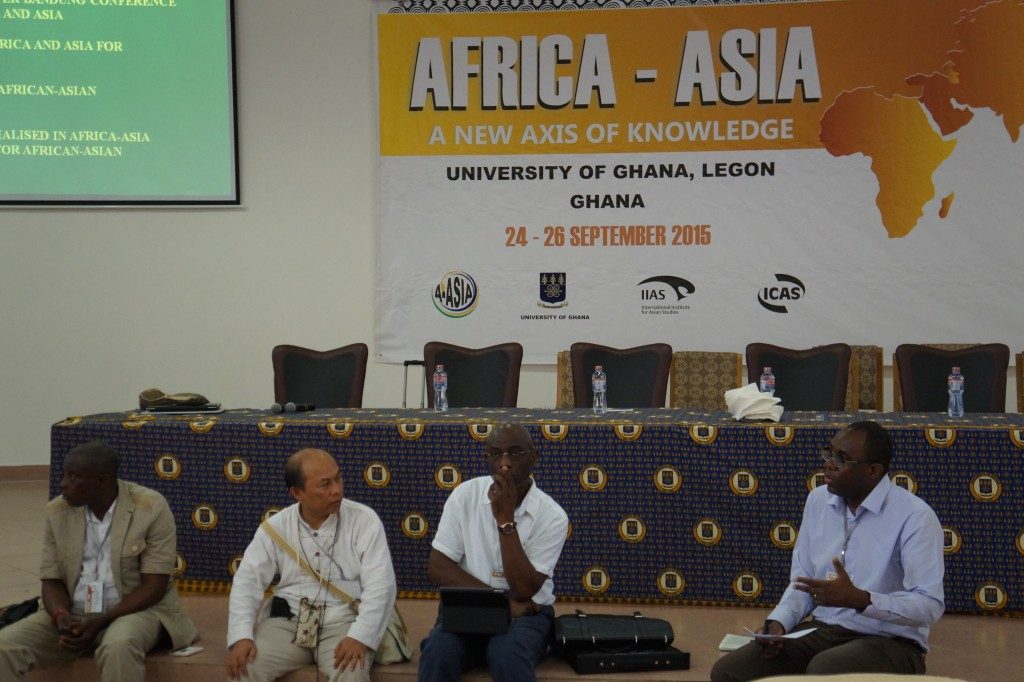International Conference “AFRICA-ASIA”
“A New Axis of Knowledge”
Accra, Ghana 24-26 September 2015
Paper presented by: Dr. Malwina Bakalarska
Title: Nigerian Students in Malaysia and China – comparative analysis of motivations to study in Asia and challenges in adaptation
During this paper presentation, Dr. Malwina Bakalarska would talk about the Africans in Asia project and illustrate two types of Nigerian students migration to South – East Asia. One type can be defined as independent in economic terms – the presence of Africans in Asia is based on their own financial resources. The second type of migration is associated with scholarships provided by local Nigerian governments as well as by the Chinese government to less wealthy Nigerians.
She would also further discuss the different motivations and consequences for Nigerians to migrate to Malaysia which are slightly different to that of China, but similar way of adaptation process. The presentation would also deal with the following research questions:
♦ Which cultural elements are familiar to Nigerians and which are difficult for them to deal with in Asia?
♦ What Nigerians consider as an attractive Asian university offer?
♦ How Nigerian students perceive the relationship between the opening of the Chinese market to African education and the effectiveness of China’s interests in Africa?
♦ What changes may occur within the African migration to Europe in the face of closer African – Asian cooperation?
This paper shall present the results of the latest (2014) field research conducted during 2 months in Malaysia and China on Nigerian Diaspora as a part of Research Grant sponsored by Polish National Science Center on its website here:

Conference Insight
Africa-Asia: A New Axis of Knowledge
Historic, is what the Accra conference will become; for it will significantly contribute to the long-term establishment of an autonomous intellectual and academic axis of exchanges between two of the most vibrant continents on the planet. Sixty years after the Bandung conference, where heads of African and Asian states gathered at the invitation of Indonesia’s President Sukarno, the Accra event is set to reflect the considerable changes that have occurred, not only in the two regions, but also at the global geopolitical level. At Bandung, parts of Africa and Asia were still in the grip of European colonialism or were subject to conflicting hegemonic designs by the then superpowers, the United States and the Soviet Union. Today’s situation is that of two continents whose interests are increasingly interconnected. On the economic front, Africa and Asia are now tightly linked through China’s massive involvement in Africa, a phenomenon that is being followed by India, Japan, Korea and Turkey. This trend runs parallel with a process of relative decline of the North (or West) at the global level in both Asia and Africa. The peoples of the two regions have long been connected through circuits of trade, religion or socio-cultural exchanges as well as long-term settlements. Yet, it is the scale and intensity of the present relationships – of capital investments, commerce, political alliances, and cultural transfers of knowledge – which urgently calls for systematic intellectual and educational engagements with the past and present of the Asian and African realities. We believe that the development of a research and educational infrastructure, capable of delivering foundational knowledge in the two regions about each other’s cultures and societies, is a precondition for a sustainable and balanced socioeconomic progress. If we limit ourselves to the question of developing Asian studies programmes in African universities, we think that access to knowledge about a world region as culturally diverse and economically powerful as Asia should enable the citizens of Africa to embrace this new intercontinental relation to its full potential. And because we live in a globalizing world, we think that others – European, North/Latin American and Oceanian institutions of Asian and African studies –should play a role as contributors and facilitators of this new trans-regional configuration. The 2015 Africa-Asia Accra conference is the result of the engagement of a wide array of public personalities, intellectuals, academics and institutions from the civil societies of Africa, Asia, Europe and North and Latin America. It was first given substance three years ago, in October 2012 in Lusaka (Zambia), where Prof. Webby Kalikiti, our colleague from the University of Zambia, convened a strategic roundtable that led to the creation of the Association for Asian Studies in Africa (A-ASIA), the continent’s first network of scholars working on and with Asia. In Lusaka, not only was the idea of A-ASIA as an inclusive pan-African network introduced, but it was also decided to organize regular international Asia-Africa conferences in Africa. Ghana was chosen for A-ASIA’s maiden conference. The choice of Ghana was not random. It was the first sub-Saharan country to regain its independence. Its subsequent development into a democratic society has moreover paralleled a long tradition of intellectual freedom at the University of Ghana, which stands as one of the major academic centres in the continent. Linked to the choice of Accra was also the sixtieth anniversary of the Bandung conference, an event for which the Ghanaian leader and the country’s first President, Kwame Nkrumah, served as one of the driving forces.

